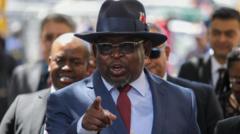After a turbulent budget presentation, South Africa's coalition government is experiencing significant challenges, notably the absence of support from major parties. Analysts suggest that Finance Minister Godongwana’s revised proposals may exacerbate divisions, creating uncertainty around the future of the coalition itself.
Budget Crisis Leaves South Africa's Coalition Government on Edge

Budget Crisis Leaves South Africa's Coalition Government on Edge
The South African government faces turmoil as rifts deepen over Finance Minister Enoch Godongwana's budget, with key coalition partners at odds regarding tax increases.
South Africa is navigating treacherous waters as discord within the coalition government escalates over the newly tabled national budget. Analysts have flagged the current situation as being unprecedented, particularly following the rejection of Finance Minister Enoch Godongwana's proposal by several coalition partners. The African National Congress (ANC) took the step of forming a coalition government of national unity (GNU) with nine parties after losing its parliamentary majority during the last elections. However, the challenge now is that without backing from its significant coalition ally, the Democratic Alliance (DA), the ANC risks failing to pass the budget unless it reassesses its contentious policies or secures support from opposition parties.
Godongwana was initially compelled to delay his budget presentation due to staunch opposition to his intended value-added tax (VAT) hike, designed to combat ongoing financial pressures as South Africans grapple with a severe cost-of-living crisis. This postponement marked a historic moment, occurring for the first time since the end of apartheid in 1994. After extensive discussions, Godongwana returned to unveil a budget he dubbed "bold and pragmatic," incorporating a reduced VAT increase slated for implementation over the next two years.
Initially proposing to raise VAT from 15% to 17%, the Minister revised his recommendation to a more modest increase of 16%. He highlighted the necessity of these tax adjustments to address the pressing financial demands on health, education, transport, and security sectors, emphasizing that choices must be made about funding school, hospital, and clinic operations. He argued against raising personal and corporate taxes, cautioning that doing so could stifle economic growth and job creation.
Critics of Godongwana’s budget argue that it will make life even more challenging for South Africans struggling to make ends meet. Despite some support from the ANC, the DA remains resolute, demanding a temporary tax increase contingent upon significant governmental reforms aimed at economic growth and job generation over the next three years. Additionally, the impasse has cast a shadow over President Cyril Ramaphosa’s reputation as a cohesive leader, with only the small Patriotic Alliance explicitly backing the budget.
The clash has also brought underlying tensions among coalition partners to the forefront, exemplified by disagreements over a contentious land law enabling the government to seize private property without compensation. Compounding the complications for the ANC, other major parties, including former President Jacob Zuma's Umkhonto weSizwe (MK) and Julius Malema's Economic Freedom Fighters (EFF), have outright rejected the budget over concerns about its impact on the impoverished sector of the population.
A Wits University political analyst, Thokozile Madonko, described the current impasse as a shift into "uncharted waters," noting that the role of parliament will be crucial in determining the fate of the budget. Historically, the ANC could seamlessly pass its policies, but this newfound fragmentation may necessitate compromise with other parties to avoid a budget rejection, which could lead to the coalition's collapse.
Madonko criticized Godongwana's approach, arguing that a more effective strategy would be to impose a wealth tax on affluent citizens rather than opting for a VAT hike, which affects the entire population. Another economic expert, Adrian Saville, dismissed the budget as replete with overpromised outcomes without solid actionable steps, especially considering the unemployment rate has surpassed 30%.
While Godongwana has garnered respect from both the business community and trade unions for his stability, the recent turbulence surrounding the budget has jeopardized his standing. The pressures intensify as he seeks to navigate this fiscal legislation effectively through parliament — with his future in the role hanging in the balance.



















